
Jonah
JONAH: Author and Date. Jonah prophesied during the peaceful and prosperous time of Jeroboam II (2 Kings 14:23–28),
who ruled in Israel (the northern kingdom) from 782 to 753 B.C. This was a time when Assyria was not thought to be a threat to Israel.

Jonah Tries to Run Away from God
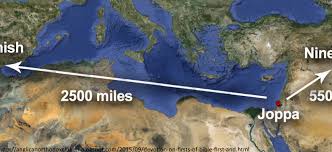 1 Now the word of the Lord came to Jonah son of Amittai, saying, 2 ‘Go at once to Nineveh, that great city, and cry out against it; for their wickedness has come up before me.’ 3 But Jonah set out to flee to Tarshish from the presence of the Lord. He went down to Joppa and found a ship going to Tarshish; so he paid his fare and went on board, to go with them to Tarshish, away from the presence of the Lord. 1 Now the word of the Lord came to Jonah son of Amittai, saying, 2 ‘Go at once to Nineveh, that great city, and cry out against it; for their wickedness has come up before me.’ 3 But Jonah set out to flee to Tarshish from the presence of the Lord. He went down to Joppa and found a ship going to Tarshish; so he paid his fare and went on board, to go with them to Tarshish, away from the presence of the Lord.
4 But the Lord hurled a great wind upon the sea, and such a mighty storm came upon the sea that the ship threatened to break up. 5 Then the mariners were afraid, and each cried to his god. They threw the cargo that was in the ship into the sea, to lighten it for them. Jonah, meanwhile, had gone down into the hold of the ship and had lain down, and was fast asleep. 6 The captain came and said to him, ‘What are you doing sound asleep? Get up, call on your god! Perhaps the god will spare us a thought so that we do not perish.’
7 The sailors said to one another, ‘Come, let us cast lots, so that we may know on whose account this calamity has come upon us.’ So they cast lots, and the lot fell on Jonah. 8 Then they said to him, ‘Tell us why this calamity has come upon us. What is your occupation? Where do you come from? What is your country? And of what people are you?’ 9 ‘I am a Hebrew,’ he replied. ‘I worship the Lord, the God of heaven, who made the sea and the dry land.’ 10 Then the men were even more afraid, and said to him, ‘What is this that you have done!’ For the men knew that he was fleeing from the presence of the Lord, because he had told them so.
11 Then they said to him, ‘What shall we do to you, that the sea may quieten down for us?’ For the sea was growing more and more tempestuous. 12 He said to them, ‘Pick me up and throw me into the sea; then the sea will quieten down for you; for I know it is because of me that this great storm has come upon you.’ 13 Nevertheless, the men rowed hard to bring the ship back to land, but they could not, for the sea grew more and more stormy against them. 14Then they cried out to the Lord, ‘Please, O Lord, we pray, do not let us perish on account of this man’s life. Do not make us guilty of innocent blood; for you, O Lord, have done as it pleased you.’ 15 So they picked Jonah up and threw him into the sea; and the sea ceased from its raging. 16 Then the men feared the Lord even more, and they offered a sacrifice to the Lord and made vows.
17 But the Lord provided a large fish to swallow up Jonah; and Jonah was in the belly of the fish for three days and three nights.
 2:1 Then Jonah prayed to the Lord his God from the belly of the fish, 2 saying,
2:1 Then Jonah prayed to the Lord his God from the belly of the fish, 2 saying,
‘I called to the Lord out of my distress,
and he answered me;
out of the belly of Sheol I cried,
and you heard my voice.
3 You cast me into the deep,
into the heart of the seas,
and the flood surrounded me;
all your waves and your billows
passed over me.
4 Then I said, “I am driven away
from your sight;
how shall I look again
upon your holy temple?”
5 The waters closed in over me;
the deep surrounded me;
weeds were wrapped around my head
6 at the roots of the mountains.
I went down to the land
whose bars closed upon me for ever;
yet you brought up my life from the Pit,
O Lord my God.
7 As my life was ebbing away,
I remembered the Lord;
and my prayer came to you,
into your holy temple.
8 Those who worship vain idols
forsake their true loyalty.
9 But I with the voice of thanksgiving
will sacrifice to you;
what I have vowed I will pay.
Deliverance belongs to the Lord
10 Then the Lord spoke to the fish, and it spewed Jonah out upon the dry land.
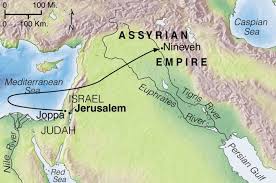
The Conversion of Nineveh
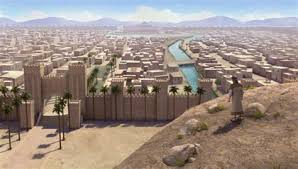 3:1 The word of the Lord came to Jonah a second time, saying, 2 ‘Get up, go to Nineveh, that great city, and proclaim to it the message that I tell you.’ 3 So Jonah set out and went to Nineveh, according to the word of the Lord. Now Nineveh was an exceedingly large city, a three days’ walk across. 4 Jonah began to go into the city, going a day’s walk. And he cried out, ‘Forty days more, and Nineveh shall be overthrown!’ 5 And the people of Nineveh believed God; they proclaimed a fast, and everyone, great and small, put on sackcloth. 3:1 The word of the Lord came to Jonah a second time, saying, 2 ‘Get up, go to Nineveh, that great city, and proclaim to it the message that I tell you.’ 3 So Jonah set out and went to Nineveh, according to the word of the Lord. Now Nineveh was an exceedingly large city, a three days’ walk across. 4 Jonah began to go into the city, going a day’s walk. And he cried out, ‘Forty days more, and Nineveh shall be overthrown!’ 5 And the people of Nineveh believed God; they proclaimed a fast, and everyone, great and small, put on sackcloth.
6 When the news reached the king of Nineveh, he rose from his throne, removed his robe, covered himself with sackcloth, and sat in ashes. 7 Then he had a proclamation made in Nineveh: ‘By the decree of the king and his nobles: No human being or animal, no herd or flock, shall taste anything. They shall not feed, nor shall they drink water. 8 Human beings and animals shall be covered with sackcloth, and they shall cry mightily to God. All shall turn from their evil ways and from the violence that is in their hands. 9 Who knows? God may relent and change his mind; he may turn from his fierce anger, so that we do not perish.’
10 When God saw what they did, how they turned from their evil ways, God changed his mind about the calamity that he had said he would bring upon them; and he did not do it.
Jonah’s Anger
4:1 But this was very displeasing to Jonah, and he became angry. 2 He prayed to the Lord and said, ‘O Lord! Is not this what I said while I was still in my own country? That is why I fled to Tarshish at the beginning; for I knew that you are a gracious God and merciful, slow to anger, and abounding in steadfast love, and ready to relent from punishing. 3 And now, O Lord, please take my life from me, for it is better for me to die than to live.’ 4 And the Lord said, ‘Is it right for you to be angry?’ 5 Then Jonah went out of the city and sat down east of the city, and made a booth for himself there. He sat under it in the shade, waiting to see what would become of the city.
 6 The Lord God appointed a bush, and made it come up over Jonah, to give shade over his head, to save him from his discomfort; so Jonah was very happy about the bush. 6 The Lord God appointed a bush, and made it come up over Jonah, to give shade over his head, to save him from his discomfort; so Jonah was very happy about the bush.
7 But when dawn came up the next day, God appointed a worm that attacked the bush, so that it withered.
8 When the sun rose, God prepared a sultry east wind, and the sun beat down on the head of Jonah so that he was faint and asked that he might die. He said, ‘It is better for me to die than to live.’
9 But God said to Jonah, ‘Is it right for you to be angry about the bush?’ And he said, ‘Yes, angry enough to die.’
10 Then the Lord said, ‘You are concerned about the bush, for which you did not labor and which you did not grow; it came into being in a night and perished in a night.
11 And should I not be concerned about Nineveh, that great city, in which there are more than a hundred and twenty thousand children who do not know their right hand from their left, and also many animals?’
|
Jonah visited Ninevah about 782 BC.
In 722 Assyrian King Sennacherib raided the Ten Northern Tribe of Israel carrying many Jews into captivity.
In 701 Sennaherib threatened Jerusalem. (Isaiah 36)

In 620 BC, Ninevah fell to the armies from the East.
The Book of Nahum describes this event.
The repentance brought about by the preaching of Jonah gave that evil city about 160 years of grace.
This was mostly mercy for the children.

Jonah the Reluctant Ambassador
Ray Stedman
Probably the best known yet least understood book in the Bible is the book of Jonah. From the world's point of view, Jonah and the whale have become a part of literature, a part of mythical legendary history. Though the story has become a by-word among people, the book is looked upon with ridicule and disbelief, and is laughed out of the Bible as being a kind of fable. It is not taken seriously, it is not taken historically. It is merely a great fish story.
It is also known for its reference to Jonah as a jinx or a bad luck charm. This is based on the time in the story when Jonah was on a boat on the way to Tarshish as he was fleeing from God, and a great storm arose. His companions asked what was causing the storm, and Jonah said, "It is me." So they threw him into the sea in order to get rid of the bad luck that was following the boat. The book is well-known because of that incident, and we sometimes call somebody who is a jinx a "Jonah."
All of this has obscured the true message of this book. Jonah was actually a historical character, and he is mentioned in other places in scripture. The book of 2 Kings refers to him as a historical prophet, a prophet ministering to Israel in the days of Jeroboam. He is referred to by the Lord Jesus Christ himself, who said, "As Jonah was three days and three nights in the belly of the whale, so will the Son of man be three days and three nights in the heart of the earth." (Matthew 12:40) With this kind of backing, there can be no doubt that the book of Jonah is historically accurate.
The true message of this story is found in the last two chapters of this little book. There you have Jonah -- after his encounter with the whale (or fish) -- going to Nineveh as God had originally sent him and proclaiming the message that God sent him to proclaim. When you ask yourself, "Why did Jonah originally refuse to go to Nineveh?" you get very close to the heart of this book's message. Why did Jonah refuse to go? You know how the story opens:
Now the word of the Lord came to Jonah the son of Amittai, saying, "Arise, go to Nineveh, that great city, and cry against it; for their wickedness has come up before me." But Jonah rose to flee to Tarshish from the presence of the Lord. He went down to Joppa and found a ship going to Tarshish; (Jonah 1:1-3a RSV)
When you are trying to run away from God, you will be amazed how often you find a ship right there, ready at hand. There is one special thing about this man Jonah I like. He paid his fare to Tarshish. If he was going to be disobedient, at least he wanted to be honest about it!
[And] ...so he paid the fare, and went on board, to go with them to Tarshish, away from the presence of the Lord. (Jonah 1:3b RSV)
Then came the great storm and the mariners cast him into the sea, and a great fish swallowed him.
The second chapter is his prayer to God to get him out of the belly of the fish. The fish got a terrible stomach-ache and vomited him up on the land. Then in chapter 3, verses 1 and 2, we are told:
Then the word of the Lord came to Jonah the second time, saying, "Arise, go to Nineveh, that great city, and proclaim to it the message that I tell you." (Jonah 3:1-2 RSV)
There is a note of sternness in God's command, isn't there? God has not changed his mind a bit. He finally has changed the prophet's mind -- but he has not relented about what he wants Jonah to say to Nineveh.
What made Jonah so anxious to avoid this commission? Why did he not want to go to Nineveh? Why did he flee from God? Well, some suggest that he had such a primitive idea of God that he regarded him as just a tribal deity, for Israel alone; that he thought God could not really be interested in Nineveh; and that is he could get out of the land, he would get away from God. I think that idea is scotched by Jonah's own reference to God. When the voyagers asked who he was, he said to them, "I am a Hebrew; and I fear the Lord, the God of heaven, who made the sea and the dry land." (1:9) That does not sound like a tribal deity to me. No, this is not why Jonah avoided going to Nineveh.
The answer is that Jonah knew God too well and that is why he did not go to Nineveh. Does that sound strange? Well, look at the beginning of chapter 4:
But it [Nineveh's repentance] displeased Jonah exceedingly, and he was angry. And he prayed to the Lord and said, "I pray thee, Lord, is not this what I said when I was yet in my country? That is why I made haste to flee to Tarshish; for I knew that thou art a gracious God and merciful, slow to anger, and abounding in steadfast love, and repentest of evil..." (Jonah 4:1-2 RSV)
Because Jonah knew that God was that way, he would not go to Nineveh. This is interesting, don't you think? Look again at the last phrase. Jonah says, "I knew you God. I knew that you were the kind that repents from evil if you get a chance." God had said to this prophet, "Now go to Nineveh and announce to them 'forty days and the city shall be overthrown.'"
And that was exactly what Jonah wanted. He wanted to see this city destroyed. This was the great enemy of his people. Perhaps Jonah had actually seen these cruel, ruthless, bloody Ninevites periodically coming down into his land and raiding his people. Perhaps he had even suffered the loss of loved ones at the hands of these merciless people. In the ancient world, the record for the bloodiest and most vicious kinds of cruelty belongs, perhaps, to the Ninevites. They found more incredibly ingenious ways to be cruel than any other nation that has ever lived. They were brutal and godless and sinful -- and Jonah hated them. The one thing that he wanted more than anything else was to see Nineveh destroyed. Yet when God told him to go announce to Ninevah its destruction, he said, "I know you too well, O God. If anybody, by repenting, gives you half a chance to be merciful, you'll change your mind and won't carry out your sentence upon them." So he fled to Tarshish.
That's amazing, isn't it? What a revelation of the knowledge of God and of the character of the God of the Old Testament! From time to time, those who do not believe the Bible -- primarily those who are educated beyond their intelligence -- say that the God of the Old Testament was a vengeful, wrathful God, a God of black thunderclouds and bolts of lightning, and that he was always killing people off. Well, do you find that here? That is riot the kind of God that Jonah knew. He says, "I knew that thou art a gracious God and merciful, slow to anger and abounding in love, and repentest of evil."
So that is what sent him to Tarshish. And even after his trip in the living submarine he was still reluctant. He still did not very much want to deliver this message, but he remembered the fish's belly and he went. He came to Nineveh, according to the word of the Lord.
Now Nineveh was an exceedingly great city, three days' journey in breadth. (Jonah 3:3b RSV)
This city would take an average of three days to cross. A day's journey was reckoned to be about twelve miles, so a three days' journey would be thirty-six miles. That is a pretty good-sized city. It was a group of cities actually -- much like Los Angeles -- clustered together around the banks of the Tigris River and forming the capital of the Syrian Empire (Assyrian Empire). And Jonah came to declare the message that God gave to him. He began a day's journey through the city, crying:
"Yet forty days, and Nineveh shall be overthrown!" (Jonah 3:4b RSV)
"Forty more days and your city will be laid waste. Forty more days and God is going to destroy this city."
Ordinarily that kind of a message would not get much of a reception. It would not today and it did not then. The Bible reports other prophets being sent with a message like this to people, who paid no attention to it. But an amazing thing happens in this story:
And the people of Nineveh believed God; they proclaimed a fast, and put on sackcloth, from the greatest of them to the least of them. (Jonah 3:5 RSV))
And when the king heard about it,
...he arose from his throne, removed his robe, and covered himself with sackcloth and sat in ashes. And he made proclamation [sounds like they had a Christian leadership week going on, doesn't it?] and published through Nineveh, "By the decree of the king and his nobles: Let neither man nor beast, herd nor flock, taste anything; let them not feed, or drink water, but let man or beast [even the animals were involved] be covered with sackcloth, and let them cry mightily to God; yea, but every one turn from his evil way and from the violence which is in his hands. (Jonah 3:6-8)
And they did it:
When God saw what they did [not just what they said], how they turned from their evil way, God repented of the evil which he had said he would do to them; and he did not do it. (Jonah 3:10 RSV)
This city was spared. Why did they listen to Jonah's message? Well, I think this would always be a mystery to us were it not for clues supplied by the Lord Jesus Christ himself. In the Gospel of Luke in chapter 11, our Lord refers to this account: "For as Jonah became a sign to the men of Nineveh, so will the Son of man be to this generation." (Luke 11:30) He said, "Jonah -- the man, the prophet -- was himself a sign to the city of Nineveh, and in just the same manner, I, the Lord Jesus Christ, will be a sign to the whole generation." He referred to Israel but he meant the whole race of man beyond that; and as Jonah was a sign to Nineveh, so the Son of Man will be a sign to this generation.
There are Bible scholars who feel that what happened to Jonah was that his features were changed by his experience in the whale's belly. There are some interesting historically -- verified incidents of men who have been swallowed by fishes, very much like Jonah was. I would recommend Harry Rimmers' book, The Harmony of Science and Scripture, in which he tells of an Englishman, a sailor, who fell overboard, and was swallowed by a fish. A day or two later the fish was seen floating on the surface of the water, and was taken ashore. When it was opened up, the sailors, to their amazement, found their shipmate alive. He survived the experience, but his skin had turned a chalky white and remained so for the rest of his life. Dr. Rimmer talked with him and learned the details of his experience. It was clearly verified. There have been other accounts like this, probably half a dozen altogether. It has happened to others besides Jonah.
The message of this book, of course, is not so much what happened to Jonah, but the results in Nineveh when Jonah rose up to preach. You can imagine what happened in this city if something like this occurred. If Jonah's face and body confirmed the remarkable story that surely this man had just gone through the harrowing experience of being swallowed alive by a fish and later vomited out, and that God had sent him to proclaim this message, you can imagine the effect upon the city. Jonah was living evidence -- documentary proof in his own being -- that God meant what he said and would do it. The city repented down to the last man, and the judgment of God was stayed.
Now do not trouble yourselves over the fact that is says God "repented." This describes God's action from only a human point of view. God knew all the time that it would happen this way; but whenever God's message is believed, this always seems to "change" his mind. Actually, though, we know it simply carries forward his purpose. The city was spared, and not until more than a hundred years later did God carry out his judgment on Nineveh and destroy it. But they were spared for now by their repentance at Jonah's preaching.
In the last chapter, then, we have the encounter between Jonah and God. One might think the story would be over with in chapter 3, the great city in sackcloth and ashes, repentant before God. But this is not what this story is after. It is trying to get us into the very heart of God. So we read that Jonah was angry with God, and he announced why he had tried to run away. He said. "I know the kind of God you are, and sure enough you did exactly what I expected. When the city repented, you changed your mind, and," he says, "I am angry." And God asks him,
"Do you do well to be angry?" (Jonah 4:4b RSV)
Jonah did not even answer. He sat down on the rimrock above the city and waited to see what God would do. I don't know how much time had gone by, but he must have waited out there a few days. The first day,
And the Lord God appointed a plant, (Jonah 4:6a RSV)
The choice of words here is interesting: God prepared a plant, appointed it. And the plant grew up and covered Jonah's head, evidence of God's gracious provision. But on the second day God prepared a worm.
... God appointed a worm which attacked the plant, so that it withered." (Jonah 4:7b RSV)
Notice the carefully-designed details here. And then when the sun came up God appointed, or prepared, an east wind that blew the heat of the desert in upon Jonah; and the poor fellow sat there sweating and suffering and suffocating until he fainted and asked that he might die. And God said again to him, "Well, Jonah, are you ready to give me your answer? I asked you a question. 'Do you do well to be angry?'" (Jonah 4:9a). I am amazed how stubborn this prophet was. He said,
"I do well to be angry, angry enough to die." (Jonah 4:9b RSV)
You know, it is easy to point the finger at Jonah, but haven't you ever said that to God, too? Haven't you ever said to him, "I want what I want. I don't care what you do. Of course I'm angry. I don't like the way you're running things. Take me away. Take me to heaven." Now notice what God said:
And the Lord said, "You pity the plant, for which you did not labor, nor did you make it grow, which came into being in a night, and perished in a night. [You feel sorry about a plant, and sorry for yourself.] And should not I pity Nineveh, that great city, in which there are more than a hundred and twenty thousand persons who do not know their right hand from their left..." (Jonah 4:10-11a RSV)
That is a Hebrew way of describing children; one hundred and twenty thousand little children. He said, "You can take pity on a plant but you can't take pity upon a great city filled with children and people who don't know their way, who don't know their God." And the book ends abruptly. Why? Because that is where it is supposed to take us -- to the revelation of the heart of God.
God loved these Ninevites, even though Jonah hated them. And I sometimes think that there is an awful lot of Jonah in us. Sometimes we act as though we would be delighted if tomorrow morning's paper reported that Moscow lay in smoldering, smoking ruins. Wouldn't we? But God loves the Russians and the Chinese and anyone else whom we for a time call our enemies. I am not trying to avoid facing facts -- we do have enemies -- but God loves them, just as he loved the enemies of Israel and would spare them whenever they repented.
And God has sent us to them to declare this word of Jonah. Do you see how suddenly and subtly the Holy Spirit has insinuated us into this picture? Around us are unsaved people -- the "godless," we call them, the lawless and the disobedient. We dismiss them from our lives saying, "Revolting, disgusting, they deserve damnation!" We sing of God's tender grace and his mercy and his compassion, but we avoid saying anything to them.
Now, I am not sitting in judgment on you. I stand with you in the dock concerning this. I am asking your heart, as I ask mine, "Isn't there an awful tendency among us to be like Jonah?" Do we really demonstrate to others the heart of the God who loves a world that is staggering on in blind, willful ignorance and that does not know where it is going?
He has sent us men and women to be a sign to this generation. And what is that sign? It is the sign of Jonah, the sign of resurrection, the sign of people who once were dead who have been made alive in Jesus Christ. Isn't that why the Lord said, "As Jonah was three days and three nights in the belly of the whale, so shall the Son of man be three days and three nights in the heart of the earth." (Matthew. 12:40) Isn't that the heart of our proclamation, that here is a God who can bring life from death, who can resurrect those who are swallowed up in the belly of a whale or fish -- lost, hopeless -- but redeemed? And the witnesses to this proclamation are the resurrected lives of those of us who, like Jonah, declare this message in our day.
Prayer
Our Father, thank you for this book and, through it, a look at our own hearts. How like this stubborn prophet we are, intent upon our own goals, our own comforts, and unconcerned about those around us whose hearts cry out for you and touch your heart of tender compassion. Lord, grant that we may feel like you feel, to have pity on the people who cannot tell their right hand from their left. And Lord, we pray that our hearts reflect your heart and show to them your love and compassion in declaring the message of truth, in Jesus' name. Amen.
Jonah: The Reluctant Ambassador
May 22, 1966

Nahum
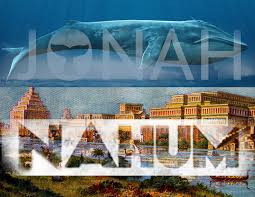
1 An oracle concerning Nineveh. The book of the vision of Nahum of Elkosh.
The Consuming Wrath of God
2 A jealous and avenging God is the Lord,
the Lord is avenging and wrathful;
the Lord takes vengeance on his adversaries
and rages against his enemies.
3 The Lord is slow to anger but great in power,
and the Lord will by no means clear the guilty.
His way is in whirlwind and storm,
and the clouds are the dust of his feet.
4 He rebukes the sea and makes it dry,
and he dries up all the rivers;
Bashan and Carmel wither,
and the bloom of Lebanon fades.
5 The mountains quake before him,
and the hills melt;
the earth heaves before him,
the world and all who live in it.
6 Who can stand before his indignation?
Who can endure the heat of his anger?
His wrath is poured out like fire,
and by him the rocks are broken in pieces.
7 The Lord is good,
a stronghold on a day of trouble;
he protects those who take refuge in him,
8 even in a rushing flood.
He will make a full end of his adversaries,
and will pursue his enemies into darkness.
9 Why do you plot against the Lord?
He will make an end;
no adversary will rise up twice.
10 Like thorns they are entangled,
like drunkards they are drunk;
they are consumed like dry straw.
11 From you one has gone out
who plots evil against the Lord,
one who counsels wickedness.
12 Thus says the Lord,
‘Though they are at full strength and many,
they will be cut off and pass away.
Though I have afflicted you,
I will afflict you no more.
13 And now I will break off his yoke from you
and snap the bonds that bind you.’
14 The Lord has commanded concerning you:
‘Your name shall be perpetuated no longer;
from the house of your gods I will cut off
the carved image and the cast image.
I will make your grave, for you are worthless.’
15 Look! On the mountains the feet of one
who brings good tidings,
who proclaims peace!
Celebrate your festivals, O Judah,
fulfil your vows,
for never again shall the wicked invade you;
they are utterly cut off.
2 A shatterer has come up against you.
Guard the ramparts;
watch the road;
gird your loins;
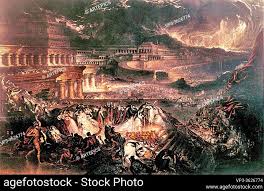
2 (For the Lord is restoring the majesty of Jacob,
as well as the majesty of Israel,
though ravagers have ravaged them
and ruined their branches.)
3 The shields of his warriors are red;
his soldiers are clothed in crimson.
The metal on the chariots flashes
on the day when he musters them;
the chargers prance.
4 The chariots race madly through the streets,
they rush to and fro through the squares;
their appearance is like torches,
they dart like lightning.
5 He calls his officers;
they stumble as they come forward;
they hasten to the wall,
and the mantel is set up.
6 The river gates are opened,
the palace trembles.
7 It is decreed that the city be exiled,
its slave women led away,
moaning like doves
and beating their breasts.
8 Nineveh is like a pool
whose waters run away.
‘Halt! Halt!’—
but no one turns back.
|
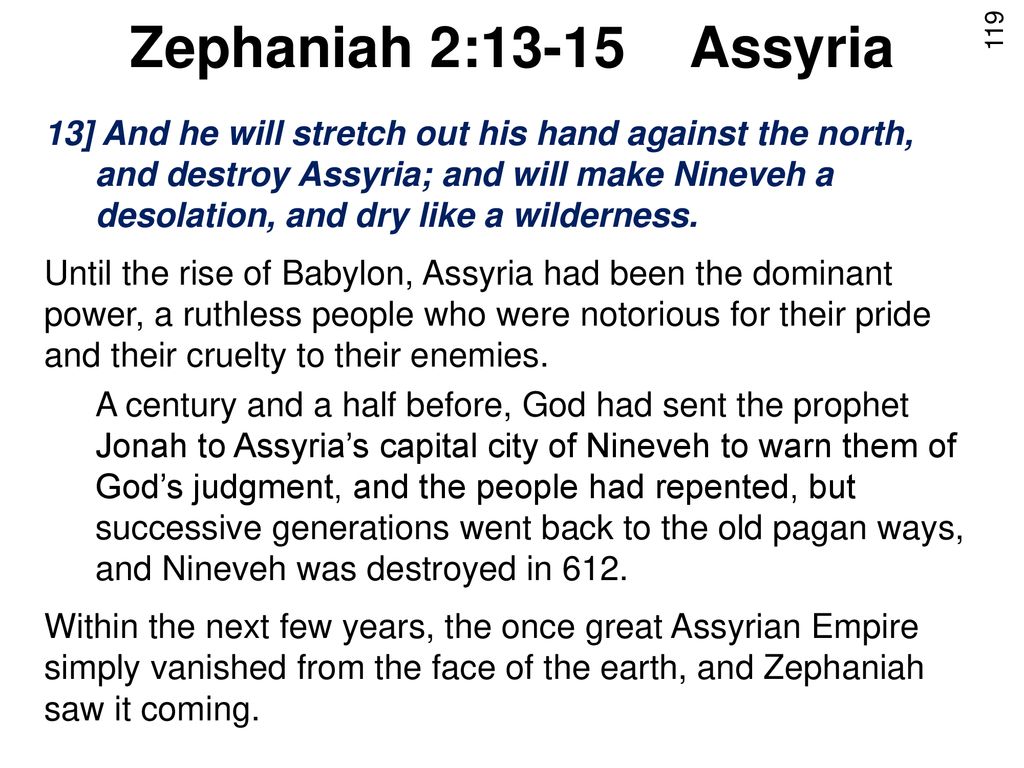

In the New Testament
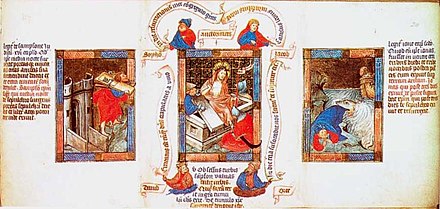
Christ rises from the tomb, alongside Jonah spit onto the beach
In the New Testament, (Matthew, 12:39–41), Jonah is mentioned in the gospels of Matthew and Luke. In Matthew, Jesus makes a reference to Jonah when he is asked for a sign by some of the scribes and the Pharisees. Jesus says that the sign will be the sign of Jonah: Jonah's rest oration after three days and three night inside the great fish prefigures His own resurrection.
He answered, "A wicked and adulterous generation asks for a sign! But none will be given it except the sign of the prophet Jonah. For as Jonah was three days and three nights in the belly of a huge fish, so the Son of Man will be three days and three nights in the heart of the earth. The men of Nineveh will stand up at the judgment with this generation and condemn it; for they repented at the preaching of Jonah, and now something greater than Jonah is here."

Links
The Holy Anger of God
The Assyrian
Ray Stedman on Jonah, The Reluctant Ambassador
Ray Stedman on Nahum, The Terrible Wrath of God
Commentary by Richard E. Young
Wikipedia on Jonah
Music
Jesus, The Light of the World
Up From the Grave He Arose
Hallelujah What a Savior
Lambert's Other Musical Selections
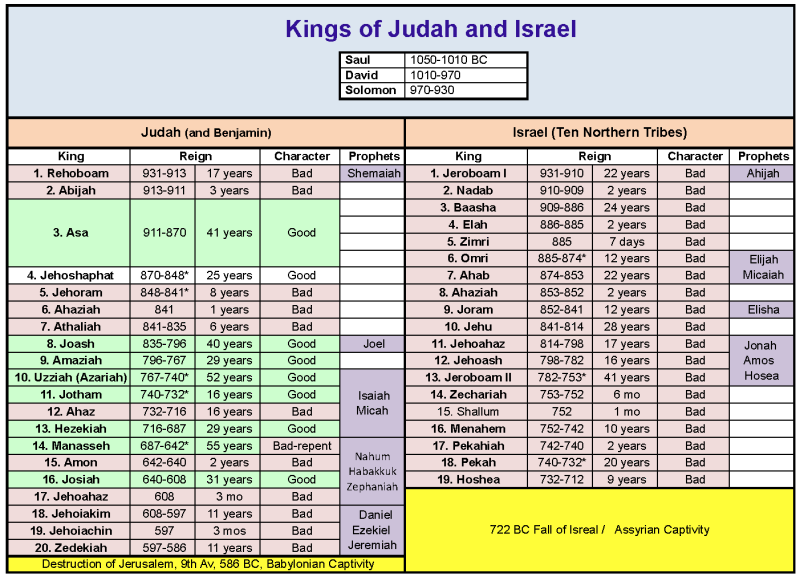

Notes by Lambert Dolphin
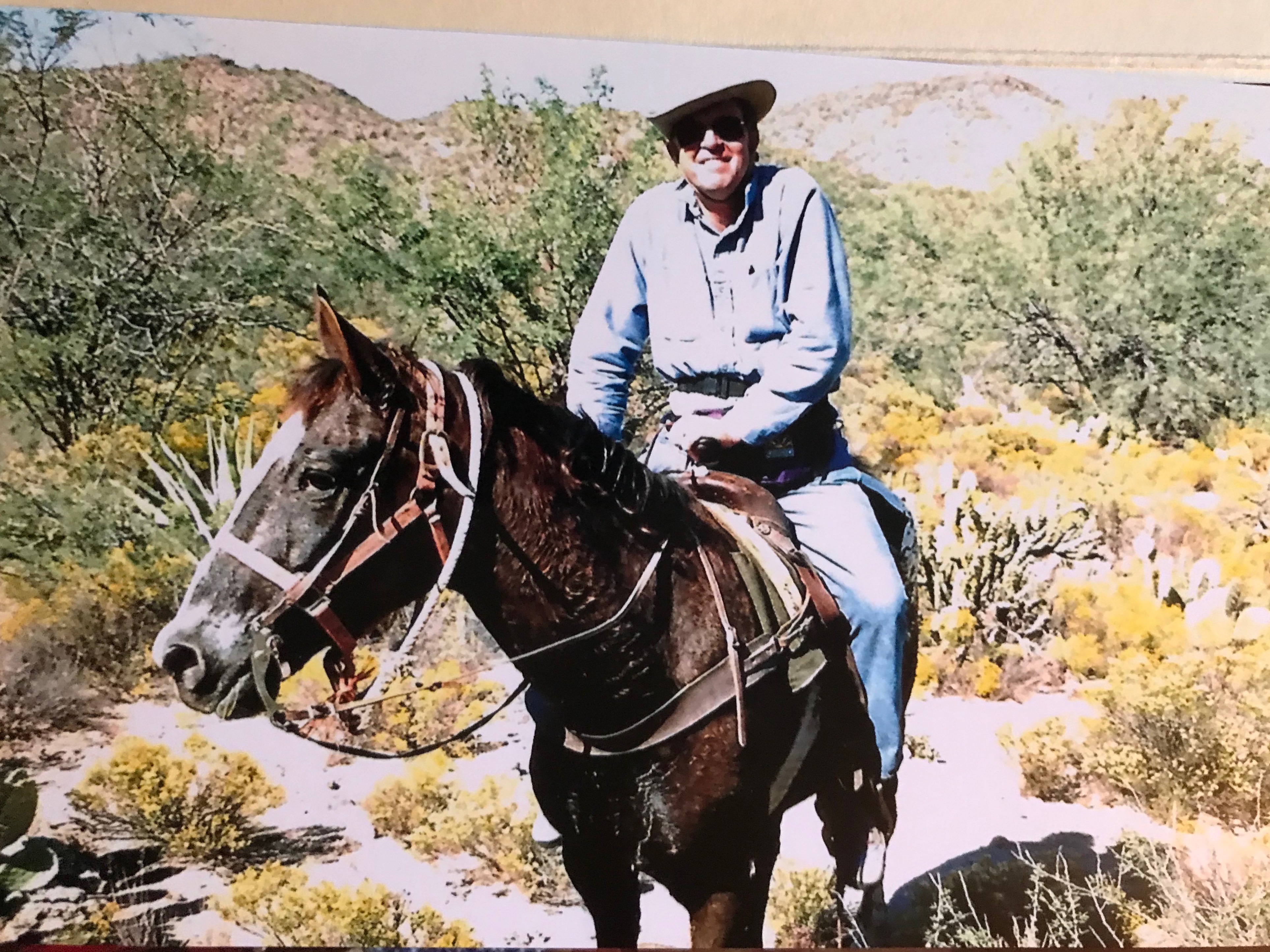
Lambert's Place
Email Lambert Dolphin
Archive for Newsletters
"Live Heresy is Better than Dead Orthodoxy Any Day"
--Horace Bissell
Library Annex (900+ new articles since 2018)
Help Thyself. No Charge.
Recent articles are at the bottom

Contributions
Lambert's Audio Library
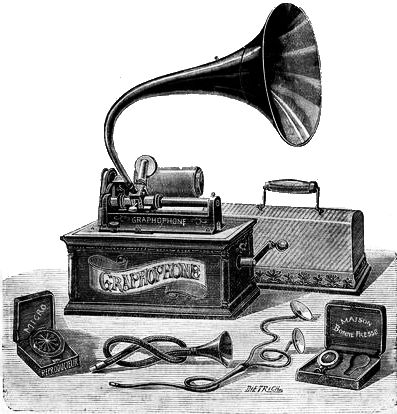

April 29, 2021. October 4, 2023.. October 29, 2023

![]()



 1 Now the word of the Lord came to Jonah son of Amittai, saying, 2 ‘Go at once to Nineveh, that great city, and cry out against it; for their wickedness has come up before me.’ 3 But Jonah set out to flee to Tarshish from the presence of the Lord. He went down to Joppa and found a ship going to Tarshish; so he paid his fare and went on board, to go with them to Tarshish, away from the presence of the Lord.
1 Now the word of the Lord came to Jonah son of Amittai, saying, 2 ‘Go at once to Nineveh, that great city, and cry out against it; for their wickedness has come up before me.’ 3 But Jonah set out to flee to Tarshish from the presence of the Lord. He went down to Joppa and found a ship going to Tarshish; so he paid his fare and went on board, to go with them to Tarshish, away from the presence of the Lord.
 3:1 The word of the Lord came to Jonah a second time, saying, 2 ‘Get up, go to Nineveh, that great city, and proclaim to it the message that I tell you.’ 3 So Jonah set out and went to Nineveh, according to the word of the Lord. Now Nineveh was an exceedingly large city, a three days’ walk across. 4 Jonah began to go into the city, going a day’s walk. And he cried out, ‘Forty days more, and Nineveh shall be overthrown!’ 5 And the people of Nineveh believed God; they proclaimed a fast, and everyone, great and small, put on sackcloth.
3:1 The word of the Lord came to Jonah a second time, saying, 2 ‘Get up, go to Nineveh, that great city, and proclaim to it the message that I tell you.’ 3 So Jonah set out and went to Nineveh, according to the word of the Lord. Now Nineveh was an exceedingly large city, a three days’ walk across. 4 Jonah began to go into the city, going a day’s walk. And he cried out, ‘Forty days more, and Nineveh shall be overthrown!’ 5 And the people of Nineveh believed God; they proclaimed a fast, and everyone, great and small, put on sackcloth. 6 The Lord God appointed a bush, and made it come up over Jonah, to give shade over his head, to save him from his discomfort; so Jonah was very happy about the bush.
6 The Lord God appointed a bush, and made it come up over Jonah, to give shade over his head, to save him from his discomfort; so Jonah was very happy about the bush. 







